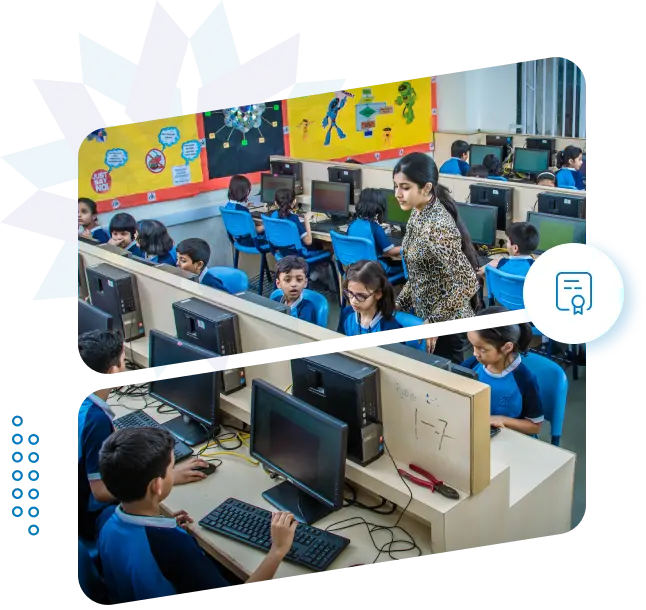
A school syllabus is an essential part of a student’s academic journey. The Indian Certificate Of Secondary Education (ICSE) is a renowned academic board established by the University of Cambridge Local Examinations Syndicate. The university conducts the ICSE examination at the end of the 10th grade and the Indian School Certificate (ISC) examination at the end of the 12th grade.
ICSE board syllabus consists of a list of topics including compulsory and optional subjects that offer a comprehensive learning experience to young minds. Here, we have listed down the ICSE and ISC curriculum for students from 1 to 12 grades in a detailed manner to assist them in understanding the curriculum and planning their study strategy accordingly.
Studying in an ICSE board school exposes students to world-class educational opportunities. Some of the key features and objectives of the ICSE curriculum are:

The Indian Certificate Of Secondary Education (ICSE) curriculum is an ever-evolving study course, covering essential subjects for students from classes 1 to 10. The board offers regular revisions in the curriculum based on the latest changes or additions in global education scenario. It is vital for both students and educators to stay up-to-date with the latest revisions or amendments to the syllabus for effective learning and teaching experience. Keep an eye on this page to get the latest amendments or revisions for the ICSE board syllabus.
Grade 1 comes under the primary section of the board curriculum. The syllabus is crafted meticulously to help students develop a basic understanding of Mathematics, English, Environmental Studies, Computers, and arts concepts that help in the overall development of young students. Class 1 ICSE syllabus is designed to keep the interest of young students through fun and engaging learning sessions.
Grade 2 is a level-up for young students, allowing them to explore new and unique concepts through an all-round study curriculum. The standard upgrade is the groundwork for students as they step into the world of holistic learning. The class 2 ICSE syllabus is bifurcated into different topics and sub-topics to help students work on their different skills such as speaking, learning, and problem-solving abilities.
The ICSE class 3 syllabus includes well-versed topics and effective resources that students are taught throughout the year. To make the curriculum more interesting and constructive for lower primary students, the board ensures regular updates of study material and resources to make it easy for students to grasp new topics and work on their learning skills.
By the time students reach class 4, they have developed the ability to comprehend basic concepts of mathematics, social studies, science and arts. The ICSE class 4 board syllabus is designed to build a strong foundation for students to continue to enhance their skills and prepare them for the next class.
The school syllabus for class 5 is the transition from primary to upper primary educational environment. The class ICSE 5 syllabus helps develop critical thinking abilities by delving into the complex concepts of mathematics, science, and more. The curriculum also aims to expose students to extra-curricular activities that contribute to their overall growth.
In class 6, students are introduced to a more comprehensive and detailed curriculum. The ICSE class 6 syllabus covers a variety of subjects, including core subjects like Mathematics, English, Science, and social studies and other elective subjects. The advanced class 6 curriculum is designed to broaden the academic horizons of students and prepare them for more specialised learning experiences.+7
The ICSE class 7 often marks an increase in academic rigour to previous classes. ICSE class 7 syllabus introduces young students to more advanced concepts and topics revolving around core and other elective subjects. Additionally, the board curriculum is designed to strengthen critical and practical thinking abilities.
While class 8 is not the national board examination year, the ICSE class 8 syllabus is designed to help students acquire knowledge and skills which are crucial for success in later academic years. Most subjects are aligned with the syllabus of the following secondary classes. Towards the end of the academic year, students are given the opportunity to choose elective subjects for board examination based on their academic interests and skills to focus on specific subjects in more depth.
The ICSE class 9 is the preparatory stage for students appearing in national-level board examinations. The ICSE class 9 syllabus is designed to introduce students to the examination pattern and overall structure of board exams that are crucial for class 10 examinations. The board curriculum includes practical and application-oriented aspects of learning.
Class 10 is the year students appear for national-level ICSE board examinations. This stage is considered a crucial milestone in a student’s academic journey. The ICSE class 10 board curriculum is prepared to help students perform well in their secondary board examinations. The knowledge and skills acquired in class 10 are often used in the admission process to higher secondary education.
Preparing for the ICSE board exams requires consistent practice and a deep understanding of the complex concepts of Mathematics, Science, English, and other subjects. A student should be thorough with the ICSE board syllabus and plan their study strategy accordingly for effective and fruitful results.
To stay up-to-date with the global education system, the board regularly revises the syllabus accordingly. The flexible and dynamic curriculum pattern helps students prepare themselves for national-level board examinations and other competitive exams. Parents and students can learn more about the upcoming or new changes in the ICSE board syllabus by visiting the official website of the board.
Generally, there are four compulsory subjects for students appearing in the class 10 board examination, including English, History & Civics, Geography, and Any second language chosen by them.
The best of 5 rule refers to the policy that allows students to include the top 5 subject scores to calculate the overall percentage of their board examination. However, it is vital to understand the policy may or may not be applicable while taking admission to certain higher education universities.
The ICSE and ISC boards are differentiated based on the academic class levels and subjects offered by each board. The ICSE board syllabus offers a broad range of subjects, while the ISC board syllabus focuses more on specialised subjects selected by each student. The ICSE board provides education till class 10, whereas the ISC board covers education till class 12.
